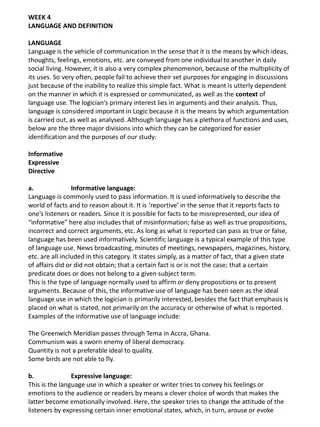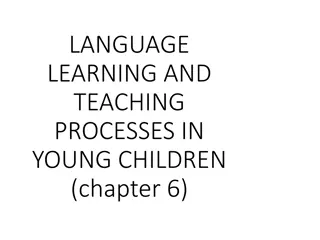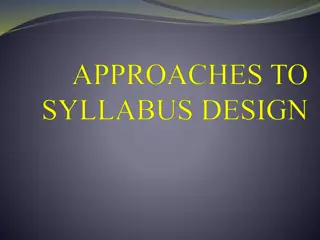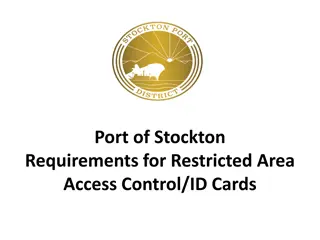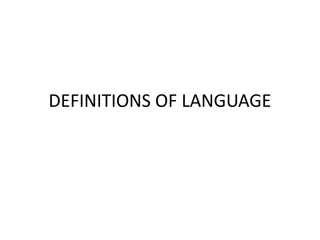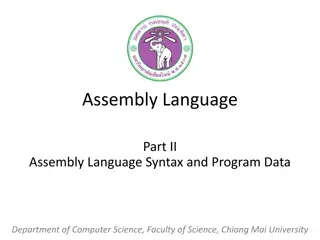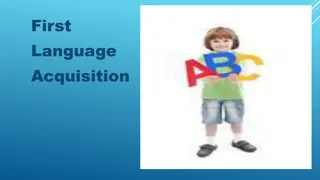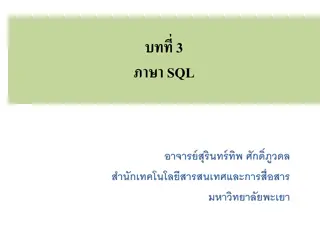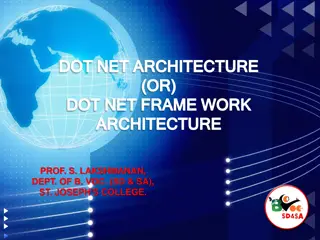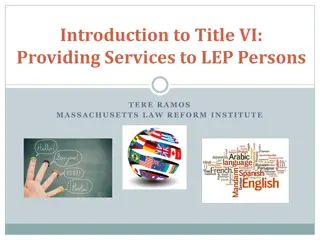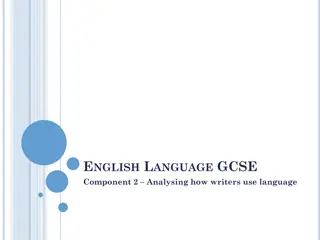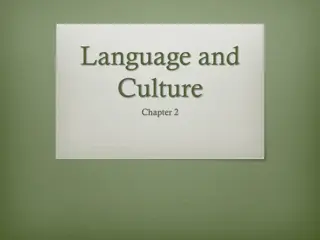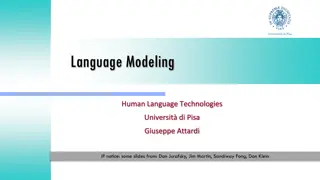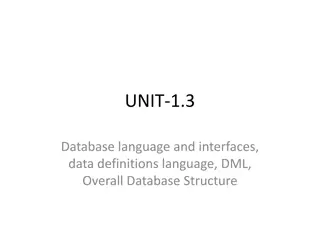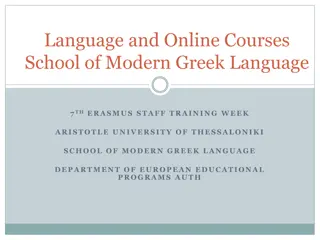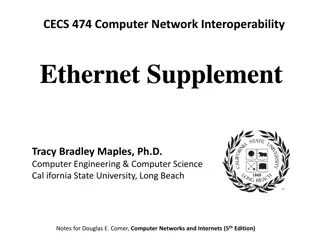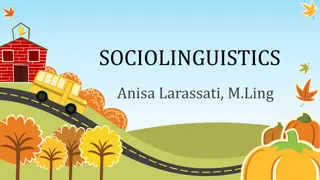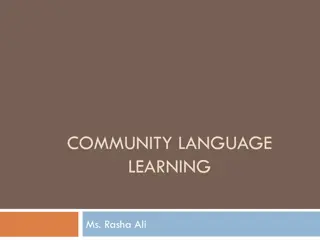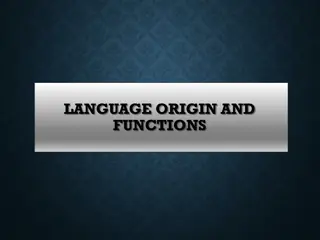Career Opportunities and Challenges in Translation & Interpreting Pedagogy Post-Pandemic
The APTIS 2022 conference explores new avenues in Translation and Interpreting (T&I) pedagogy amidst a changing landscape. Dr. Bego A. Rodriguez highlights emerging roles for T&I graduates. The context reveals a decline in language learning in the UK, impacting the Language Service Industry. The UK'
0 views • 13 slides
Language Study Community – Enhance Your Language Skills
Joining a Language Study Group is a fantastic way to take your language learning to the next level. By leveraging the power of Group Study, you can immerse yourself in the language, enhance your understanding, and build confidence in your speaking abilities. Read full article \/\/explainlearning.com
1 views • 3 slides
Academic Language Demands and Supports in Instructional Planning
Academic Language Demands and Supports are crucial in educational settings to ensure comprehension and usage of language by students. This content discusses embedding language demands in lesson plans, providing language supports, and peer review activities to enhance academic language skills. The fo
6 views • 10 slides
The Significance of Media in Language Learning
Media plays a crucial role in language learning by raising awareness of the ideology behind linguistic structures and providing valuable information on society and culture. Linguists are drawn to media language for research purposes and to understand its impact on language use and attitudes. Media s
12 views • 5 slides
Understanding Translation: Key Concepts and Definitions
Translation involves transferring written text from one language to another, while interpreting deals with oral communication. Etymologically, the term "translation" comes from Latin meaning "to carry over." It is a process of replacing an original text with another in a different language. Translat
11 views • 76 slides
Language and Communication in Society: Understanding Interactions
Explore the intricate relationship between language and society through lectures focusing on language in interaction, power dynamics, language contact and change, public space discourse, linguistic landscaping, and more. Delve into the shift from structural linguistics to societal communication, red
6 views • 28 slides
2022 Thales Access Management Index
Thales Access Management Index highlights the current landscape of access security, revealing insights on multi-factor authentication adoption, remote and privileged user access management, VPN usage trends, challenges faced, and preferences towards third-party access management. The report emphasiz
2 views • 9 slides
Understanding Language: Informative, Expressive, and Directive Uses
Language serves as a vital medium for communication, allowing the conveyance of ideas, thoughts, and emotions. It is a complex phenomenon with diverse uses. This text delves into the three major divisions of language use - informative, expressive, and directive. Informative language conveys facts, w
4 views • 6 slides
Personnel Safety Systems and Access Control at CERN Facilities
Personnel Safety Systems at CERN include ODH detection, fire safety measures, and access control to protect personnel from hazards. Various access control layers are implemented to regulate entry to different parts of the facility, ensuring only trained personnel access underground areas. Biometric
0 views • 19 slides
Language Learning and Teaching Processes in Young Children
Development of language in young children is influenced by various factors such as their cultural and linguistic environment, unique characteristics, and interactions with adults. Optimal language development requires language stimulation from the environment. Varied cultural practices impact langua
1 views • 51 slides
Understanding Language in Stoicism: Significance and Corporeality
Language in Stoicism plays a crucial role in the process of assenting to impressions by focusing on corporeality, reason, and truth. It distinguishes between the mundane vocal sounds, articulated speech, and significant language to convey meanings effectively. The significance of language lies not i
2 views • 13 slides
Understanding Language Teaching Syllabus: Integration, Theory, and Approaches
Language Teaching Syllabus involves the integration of subject matter and linguistic elements, guided by theories of language and learning. Various approaches like Grammatical, Situational, Communicative, and Analytic are used to structure syllabi. Breaking language into parts aids in sequential lea
1 views • 28 slides
Port of Stockton Restricted Area Access Control and ID Card Policy
Access to restricted areas at the Port of Stockton facilities requires possession of a TWIC (Transportation Worker Identification Credential). Only authorized personnel, such as employees, contractors, and those with regular access, may receive a Port Access Card after approval by the Facility Secur
0 views • 6 slides
Exploring Language and Communication Through a Short Film
In this lesson, students will watch a 10-minute short film titled "The Most Beautiful Thing" by Cameron Covell. They will reflect on the value of learning another language, analyze how facial expressions and body language convey emotions, and develop empathy towards those facing language barriers or
0 views • 29 slides
Various Definitions of Language Throughout Linguistic History
Different linguists and scholars have offered various definitions of language over time. Sapir (1921) emphasized language as a method of communicating ideas, emotions, and desires through voluntary symbols. Bloch and Trager (1942) focused on the social aspect of language as a system of vocal symbols
1 views • 12 slides
Introduction to Assembly Language Syntax and Program Data
Learn about the syntax of assembly language and how data, variables, and constants are used in programming. Explore the basic instructions and the translation of high-level language into assembly language. Discover the role of an assembler in translating assembly language programs into machine langu
4 views • 36 slides
Enhancing Language Learning Across the Curriculum in B.Ed. 1st Year Course
Language Across the Curriculum (LAC) emphasizes that language learning should occur across all subjects, not just in language classrooms. It highlights the importance of incorporating language development into every learning activity, fostering multilingualism in schools. Language plays a crucial ro
2 views • 34 slides
Understanding First Language Acquisition Process
First language acquisition is the process through which humans develop the capacity to perceive, comprehend, and effectively use language to communicate. It primarily focuses on infants acquiring their native language. Basic requirements, caregiver speech features, and the acquisition schedule play
0 views • 19 slides
Comprehensive Overview of SQL Commands and Language Categories
In this detailed guide, you will learn about Structured Query Language (SQL) including its various commands such as Data Definition Language (DDL), Data Manipulation Language (DML), Data Control Language (DCL), and Transaction Control Language (TCL). Explore how SQL is used in Database Management Sy
0 views • 15 slides
Speech and Language Developmental Milestones: A Bilingual/Multilingual Perspective
Speech and language developmental milestones are crucial for children, regardless of their home language. These milestones encompass receptive language, expressive language, pragmatics, and articulation and phonology. Understanding how a child hears and talks from birth to one year is essential, as
1 views • 23 slides
Understanding .NET Framework Architecture and Common Language Runtime
This content delves into the intricacies of .NET architecture, highlighting its structure, common language runtime, and key components such as Common Type System (CTS) and Common Language System (CLS). It explains how .NET supports multiple languages, facilitates cross-language interoperability, and
0 views • 13 slides
Understanding Language Rights and Title VI Requirements for Limited English Proficient Individuals
Providing services to Limited English Proficient (LEP) individuals is essential to ensure equal access to programs and activities receiving federal financial assistance. Title VI of the Civil Rights Act of 1964 prohibits discrimination based on race, color, or national origin. It is crucial to addre
0 views • 23 slides
Analyzing Writer's Language Use in English Language GCSE Component 2
In English Language GCSE Component 2, students learn to analyze how writers use language. The learning objective focuses on commenting, explaining, and analyzing language use with relevant subject terminology. The exam assesses students on their ability to interpret and explain a writer's thoughts,
0 views • 12 slides
Language and Culture Reflections: Diversity in Linguistic Emphasis
Exploring the correlation between language and culture, this content delves into how various languages reflect cultural values and priorities. Through examples like the Inuit language with rich vocabulary for snow and seals, the Shinzwani culture's unique word for mother and aunt, and the evolving l
0 views • 50 slides
Understanding Language Modeling in Human Language Technologies
Exploring the concepts of language modeling in human language technologies, this presentation delves into N-grams, the chain rule of probability, evaluation metrics like perplexity, smoothing techniques such as Laplace, and the goal of assigning probabilities to sentences. It covers applications lik
1 views • 81 slides
Introduction to Language Technologies at Jožef Stefan International Postgraduate School
This module on Knowledge Technologies at Jožef Stefan International Postgraduate School explores various aspects of Language Technologies, including Computational Linguistics, Natural Language Processing, and Human Language Technologies. The course covers computer processing of natural language, ap
0 views • 27 slides
Exploring Sociolinguistics: Language Variation and Social Factors
Sociolinguistics delves into the study of language variation influenced by social factors, examining the relationship between language and its social context. It explores various aspects like standard pronunciation, language choice, speech acts, language components, language variety, and factors suc
0 views • 73 slides
Understanding Assembly Language Programming for Computing Layers
Assembly language is a low-level programming language that enables direct interaction with a computer's hardware components. This content explores the fundamentals of assembly language, the relationship between human-readable machine language and binary code, an assembly language program for multipl
0 views • 31 slides
Database Language and Interfaces Overview
A database management system (DBMS) requires appropriate languages and interfaces to handle queries and updates for data manipulation and control. This includes Data Definition Language (DDL), Data Manipulation Language (DML), Data Control Language (DCL), and Transaction Control Language (TCL). Each
0 views • 12 slides
Open Access at Charles University: Opportunities and Challenges
Charles University is navigating the landscape of open access following the implementation of the Czech National Open Access Strategy. The university is working towards making all research articles and proceeding papers open access, monitoring article processing charges, and promoting open access as
0 views • 24 slides
Understanding Language Anxiety in Foreign Language Learning and Teaching
Explore the impact of language anxiety on students and teachers in foreign language learning and teaching contexts through insights from Dr. Christina Gkonou's research. Delve into the theoretical background, implications for language education, and real-life experiences shared at the Essex Language
0 views • 25 slides
Strengthening Language Rights: Official Languages (Amendment) Act 2021
The Official Languages (Amendment) Act 2021, enacted to strengthen the language rights of Irish speakers, introduces provisions for public bodies' communications in official languages. Section 10A requires public bodies to allocate a minimum of 20% of advertising in Irish and 5% of ad expenditure in
0 views • 49 slides
Understanding Language Development in Children with Assistive Technology
Explore the nuances of speech vs. language development in children, focusing on the benefits of using alternative language modes such as signs, pictures, and gestures. Delve into the definition of language and speech, set the stage for discussions around assistive technology, and learn about the imp
0 views • 40 slides
School of Modern Greek Language: Courses, Seminars, and Assessment Overview
Explore the School of Modern Greek Language at Aristotle University of Thessaloniki offering language courses, seminars for teachers, and assessment exams. Founded in 1970, the school provides a multicultural environment for students worldwide, emphasizing Greek culture and offering a variety of lan
0 views • 17 slides
Understanding Ethernet and Multiple Access Protocols in Computer Networks
Exploring the fundamentals of Ethernet and multiple access protocols in computer networks, this content discusses the two primary categories of multiple access protocols - contention access and controlled access. It delves into topics such as CSMA/CD, LANs, performance of multiple access schemes, ad
0 views • 7 slides
Understanding Sociolinguistics: Language and Society Interactions
Sociolinguistics is the study of the relationship between language and society, analyzing how language reflects and shapes social structures. It explores the uses of language within different communities, addressing power dynamics and societal norms. Sociolinguists examine language patterns, attitud
0 views • 63 slides
Language Views and Norm Change in Standardized Finnish: An Examination by Henni Pajunen
Henni Pajunen explores language views and resistance to norm change in standardized Finnish at the XVII Muutuva Keele Päev Conference. The research delves into language planning in Finland, historical shifts in Finnish language norms, and specific orthographic norms relating to verbs. The study she
0 views • 21 slides
Effective Community Language Learning Method by Ms. Rasha Ali
Community Language Learning (CLL) method emphasizes understanding students' feelings and creating a supportive environment for language learning. This approach, influenced by the Counseling-Learning approach, focuses on building relationships, reducing anxiety, and promoting effective communication
1 views • 15 slides
The Origin and Functions of Language
Exploring the origin of language, this content delves into the historical perspective of when and how human language evolved. It discusses the role of language in human society, its functions in socialization, information exchange, commanding, persuading, and influencing. Additionally, it touches up
0 views • 8 slides
Exploring Language, Decision-Making, and Consumer Psychology
Delve into the intricate relationship between language and decision-making, discover how advertising utilizes language to influence consumer behavior, and examine the impact of semantics and the framing effect on our perceptions. Understand the elements of language, such as phonemes, morphemes, and
0 views • 76 slides







